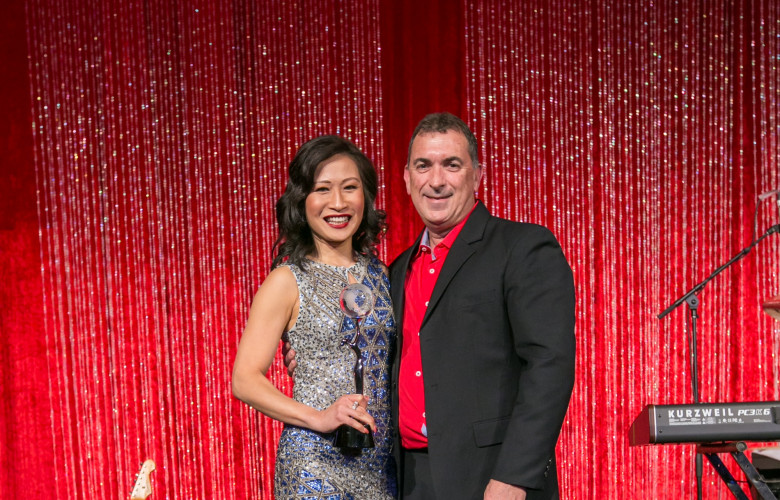Get to know leading WA real estate agent, Vivien Yap
Contact
Get to know leading WA real estate agent, Vivien Yap
Trailblazer Vivien Yap started out as a successful Perth chemist, but after buying and selling a number of her own properties, decided to take the leap into real estate. She recently became the first woman to win LJ Hooker's top selling principal award.
Vivien Yap began her career as a successful Perth chemist, buying her first pharmacy when she was only 24. After buying and selling a number of her own homes and investment properties, and with the encouragement of her friends, Yap decided to make the leap into a career in real estate.
She was recently recognised as LJ Hooker's top selling principal, the first time in the award's 22-year history the prize has gone to a woman. And her LJ Hooker Dalkeith | Claremont team won Top Team at the reiwa.com.au awards.
I understand you were previously a successful chemist in Perth. What made you make the jump to real estate?
I spent more than 20 years in the pharmaceutical industry, buying into my first pharmacy when I was 24, which was a huge decision.
Whenever I sold my own homes or investment properties, I took a very close interest in the process and even contributed to the marketing strategies.
When you’re a pharmacist, you need to be very consultative and evidence-based in your approach to solving problems for your customers. It’s a very similar human interaction in real estate: you’re trying to solve an issue for a buyer or seller, and they often need to talk to you at uncommon hours of the day or night.
I had plenty of friends, family, colleagues and friends who thought I had the right demeanour and drive to make the transition from pharmacy to real estate so I decided to do a career u-turn.
At LJ Hooker's International Conference last week, you took out the top award for selling principals, and your LJ Hooker Dalkeith | Claremont team won Top Team at the reiwa.com.au awards. What do you attribute your success to?
I think understanding that when someone entrusts to you with their most valued possession, that you’ve got to provide them with guidance, persistence, strategic mobility and negotiation skills that they can’t get anywhere else. A lot of my clients are discerning business people who recognise what quality service involves, which sets a high benchmark for me and my team.
A point of difference is also important. For instance, Perth doesn’t have the auction culture that Sydney or Melbourne has; less than five per cent of properties are sold via auction in the metropolitan area. But about 10% of our office’s sales are done by auction, offering clients shorter days on market, which has been a major challenge for Perth sellers in recent years.
You must be highly adaptive, and if you don’t have the time to upgrade your skills, you need people around you that can address that shortfall. I invest heavily in digital initiatives and making sure I use people with astute knowledge of the sector, making sure the content and strategies are cutting edge and have strong ROI.

Image: Yap recently sold this four-bedroom house at 23 Van Kleef Circuit, Mount Claremont, for $1.63 million.
The Perth market has been in a slump since the downturn in the mining sector. How is the market faring now?
The upper end of the market has shown price improvements and that’s partly attributable to international and interstate investors whom have recognised the Perth’s affordability, relative to the last decade.
But there’s also a lot of owner-occupants who are choosing to upgrade in the same market. They’re taking a loss or little capital growth over the last five to 10 years, but cancelling it out in the purchase of their next property.
In the last month, I’ve had two properties that were sold following their first open for inspections in sought-after Nedlands; that’s a positive indication that people recognise this level of value won’t last forever.
What’s your outlook for the Perth property market?
We’re still some way off seeing price growth across all markets. We are, however, seeing a contraction in the length of time properties are spending on the market.
It’s likely that the rental market will remain soft in the near future. Landlords can do more than reduce their asking rents, however, to secure a tenant: we’re advising a lot of clients on cost-effective ways to position their assets to secure quality, long-term leases.
Is real estate a good career for women?
Absolutely. In our office, the women outrank the men almost two to one and represent every service discipline we offer.
Clients want results, and whether that comes via a female or male sales agent doesn’t really concern them. What does concern clients is how you juggle your professional and personal commitments.
I work long hours – and our team works seven days a week – to maximise our service to clients, but I make sure it doesn’t impinge on my family life. I’m up early in the morning to make school lunches and once the children are in bed, I’ll be spending time with my husband, closing out actions from the day just gone and planning for the next day.
You must fully commit to real estate for success – it’s a lifestyle.
If you could change one thing about the real estate industry, what would it be?
The perception of real estate agents. I would like to assist in transforming real estate into a truly recognised profession. We work so hard but still battle a public image that views us as less than what we are worth and contribute.
Where do you live now, and where would you live if you could live anywhere in the world?
I live in Perth’s Western Suburbs. I would not choose to live anywhere else but in the Western Suburbs: I grew up here and love being close to my family. The demographic and proximity to the beach, city and quality of schools for my children are all the indicators I need to know that this is my home forever. I love to travel for work and pleasure, but I couldn’t imagine myself being away from the Western Suburbs for any longer than that.
Read more about Vivien Yap:
reiwa.com Awards: celebrating WA real estate's finest





